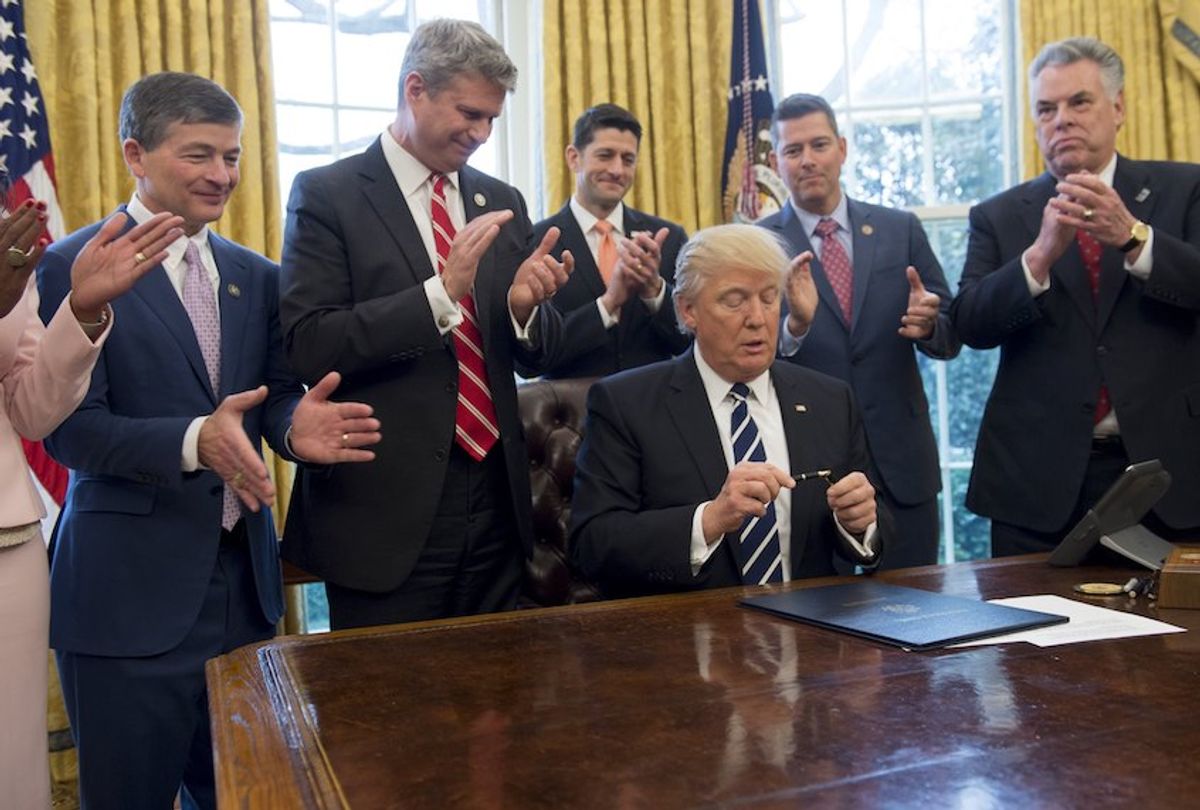President Donald Trump's ongoing efforts to roll back regulations designed to protect the environment, workers, and public health likely played a significant role in the spread of Covid-19 in the United States.
That's according to a new report released Tuesday by New York University School of Law's Institute for Policy Integrity (IPI), a nonpartisan policy think tank.
The 45-page report titled "Weakening Our Defenses" (pdf) details how Trump's far-reaching deregulatory push has exacerbated several major risk factors for contracting and spreading Covid-19, such as high levels of air pollution, hazardous working conditions, and lack of adequate health insurance.
"President Trump's deregulatory agenda has affected all those factors, and, therefore, the disproportionate racial and economic justice impacts of deregulation are now most likely compounding in deadly ways in the wake of the Covid-19 pandemic," the report says.
"Even before the pandemic," the report continues, "those regulatory decisions collectively were already causing dire consequences for public health and safety, the environment, and economic conditions—but we now know that those regulatory decisions have likely also increased our collective susceptibility to Covid-19."
The report cites the Trump administration's rollback of restrictions on nearly 2,000 forms of hazardous air pollution in 2018, weakening of the Clean Power Plan, and gutting of vehicle fuel efficiency standards in 2020 as examples of environmental deregulatory actions that left the U.S. more vulnerable to Covid-19. The U.S. currently has the most confirmed coronavirus cases and deaths in the world.
"These rollbacks have put all of us—especially low-income communities, Black people, and people of color, and essential workers—at higher risk of contracting and dying from Covid-19," said Gina McCarthy, former Environmental Protection Agency administrator and current president of the Natural Resources Defense Council.
The report also points to the Trump administration's weakening of workplace safety standards at meatpacking plants, which have become major Covid-19 hotspots. According to the Centers for Disease Control and Prevention, more than 16,200 meat and poultry processing workers have contracted Covid-19 at 239 facilities in the U.S.
"In October 2019, the Trump administration's Department of Agriculture finalized a rule to 'modernize' swine slaughter inspections," IPI's report says. "The new program, which pig processing plants may opt into, reduces the number of food safety inspectors in plants and removes caps on pig slaughter line speeds."
By forcing workers to perform their jobs in close proximity to one another, the report notes, the prioritization of speed over safety forces "likely puts meat processing workers at greater risk for Covid-19."
The Trump administration's efforts to undermine the Affordable Care and limit Medicaid eligibility by approving state-level work requirements also may have contributed to the spread of Covid-19, according to the new report.
"Though some of these state requirements have since been invalidated by the courts, other state programs could yet be implemented, and even the temporary loss of coverage in some states could be significant—particularly during a pandemic," the report says.
Dr. Kathleen Rest, executive director of the Union of Concerned Scientists, said in a statement that the Trump administration's "failure to listen to and act on the best available science is irresponsible and dangerous."
"From day one, the Trump administration has attempted to roll back not only existing public health protections, but the scientific basis on which all public health protections are based," said Rest. "That's short-sighted and foolish at the best of times, but they have continued to dismantle safeguards even as the country faces the threat of Covid-19, one of the biggest public health crises in our history."



Shares